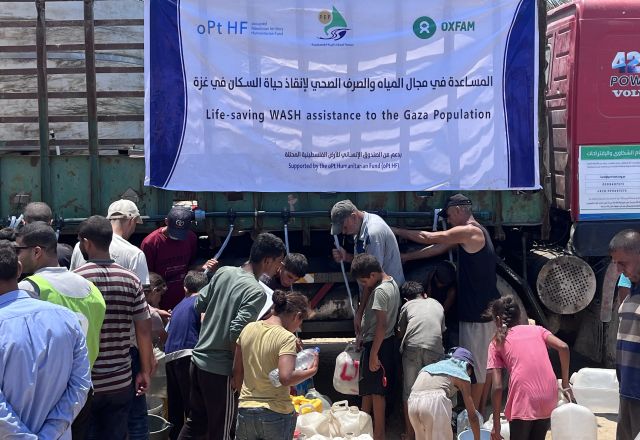
- 2 mins read time
- Published: 25th July 2024
The difficulties of delivering humanitarian assistance during the war in Gaza
Have you ever wondered how non-governmental organisations (NGOs) get lifesaving goods into Gaza during this horrific war? It’s very difficult.
Oxfam and other NGOs operating in Gaza have consistently reported that Israel’s obstruction of routes, and its ongoing attacks on aid operations, has prevented the effective delivery of aid to people in need. There is simply not enough aid entering Gaza to meet the needs of people there.
- None of the land crossings into Gaza have been fully functional since October 2023.
- The North of Gaza has been effectively cut off from the South by the Israeli army.
- Since early May, most organisations have had to stop purchasing new goods due to their building backlogs, with the lack of functioning entry routes into Gaza.
- There are reportedly over 1,500 UN/NGOs trucks currently waiting in Al Arish in Egypt to cross into Gaza.
The closures and backlogs around crossings caused by the Israeli military operation resulted in Oxfam taking five weeks to transport 1,600 food parcels through the West Erez/Zikim/As-Siafa crossing in Northern Gaza. This journey should take no more than six hours, and the processing of the delivery should take no more than three days. Delays in the heat can cause perishable food items to get spoiled during the journey.
The region has been heavily impacted by continuous Israeli bombings, destroying infrastructure. This has forced Oxfam’s local partners and others to take less dangerous journeys. Lack of fuel is another barrier to distributing humanitarian assistance.
The deteriorating environment has severely impacted humanitarian organisations and their ability to operate.
Several NGOs reported that their teams are required to notify the Israeli authorities of their movements, even within designated “humanitarian zones.” They must wait for acknowledgement before continuing into the area. The purpose of these so-called "humanitarian zones," is to ensure safe and free movement. There is no safe place in Gaza.
Despite these notifications, NGO premises, infrastructure, and workers have repeatedly come under attack. Over 500 healthcare workers and 274 aid workers have been killed in the last nine months. These workers should never be targeted.
Read our Humanitarian Snapshot. Numerous organisations have fed into this, detailing the issue.




